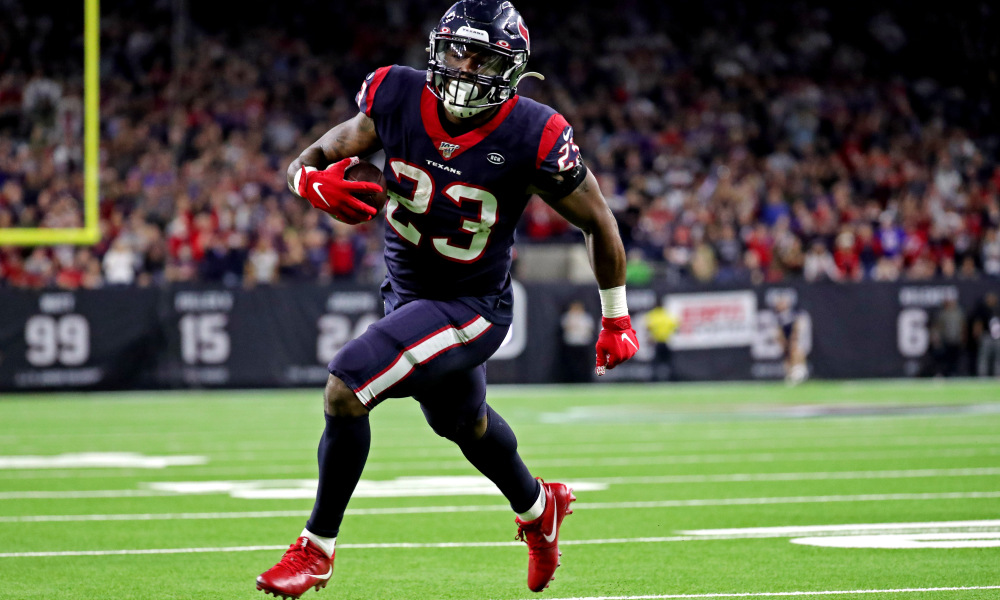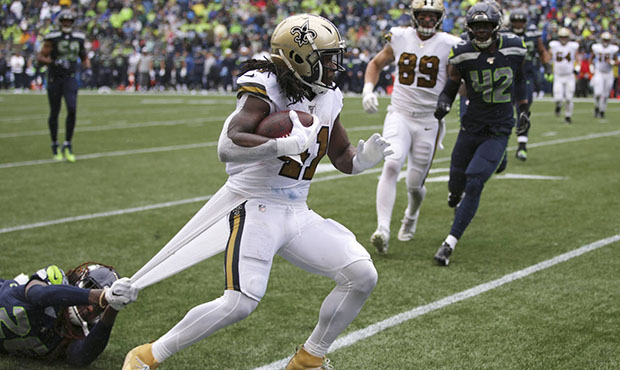
Marshawn Lynch. In an article about what the Seattle Seahawks look for in a running back, all we have to do is look back to Marshawn’s prime years as a Seahawk to understand what they are searching for. Power, force of will, determination are terms used to describe Beast Mode. If you have forgotten what that looks like (it’s been a couple years), take a look. He was an offensive engine in his own right, allowing the Seahawks to ride his production all the way to a Super Bowl win in 2013. He was an icon.
Unfortunately, icons are rare. The Seahawks found this out quickly after Lynch originally retired from the team in 2016. Those who tried to follow in his footsteps have failed for a multitude of reasons. But Seattle, even with an MVP-level quarterback on their roster, insists on using a heavy rushing attack on offense. The Hawks chose to run the ball 44% of the time in 2019, the third-highest rate in the league. Head coach Pete Carroll and offensive coordinator Brian Schottenheimer seem dead set on trying to re-create what Marshawn used to give them.
While the effectiveness of this game plan warrants an article on its own, we will instead focus on the players who benefit from such an approach—the running backs. We will look at and examine how each back on this roster fits what Seattle wants to do on offense, the particular role they are projected to occupy and how many times we’ll likely hear their names said on gameday. We will be using data from Pro Football Focus (PFF) and Football Outsiders to aid us in breaking this down.
Running Backs On Roster:
Chris Carson
Rashaad Penny
Carlos Hyde
Travis Homer
DeeJay Dallas
Anthony Jones
Patrick Carr
Let us start by taking a look at Seattle’s leading rusher from 2019, Chris Carson. Both statistically and analytically, the fourth-year pro has pro-bowl potential. He put up season totals of 1,230 rushing yards at 4.4 yards-per-carry, to go along with 7 rushing touchdowns. If you tack on his receiving production, 37 receptions for 266 yards, he has the make-up of a true three-down workhorse running back. Outside of pure production, he adds a flair for the dramatic as well. Whether it’s running through, running around, and (most notably) running over the top of would-be tacklers, Carson is spectacular to behold. The advanced stats certainly back this up, as Pro Football Focus has him as their 9th ranked running back and Football Outsiders has him ranked 10th. He has proven productive, flashy and effective in his time as Seattle’s lead battering ram.
It would seem from the stats that Seattle may have found an heir to Marshawn Lynch to center their offense around. Unfortunately, the stats don’t tell the whole story. There is a Bill Parcells quote that fits nicely here: “A football player’s best ability is availability.”
Chris Carson has ended two of his three seasons in the league on injured reserve for a combination of hip, leg and ankle injuries. It is difficult to center an offense around a player that isn’t there, which unfortunately has been the case with Carson so far in his career.
Also concerning for the Seahawks is Carson’s recent issue with butterfingers. After only fumbling three times his previous two seasons, Carson put the ball on the ground six times in 2019. Turning the ball over is a quick way for talented runners to find themselves on the bench, especially for a team like Seattle, where Coach Pete Carroll regularly preaches the importance of winning the turnover battle.
While supremely gifted, Carson has enough concerns about availability and ball protection that Seattle hasn’t been willing to go all-in on him.
Which is part of the reason why Seattle spent a first-round draft pick on Rashaad Penny in 2018. The former San Diego State Aztec was an absolute monster in college, plowing his way for 2,248 rushing yards at 7.8 yards a clip. Those were numbers that got him on the Heisman ballot, finishing 5th in voting for 2017. It was quite the investment and a signal to indicate that Seattle would continue in its run-heavy ways.
The return on this investment has been, well… mixed. On the positive side, he has shown some serious flashes. He rushed for 129 yards against the Eagles in their week 7 match-up, including a run where he absolutely scorched the Philly defense on a 58-yard romp to the endzone. When given consistent touches, Penny has shown the ability to use his speed to gash a defense, as evidenced by his 5.7 yards-per-carry mark from last season. The problem is that it happens not nearly enough. In his two seasons in Seattle, he has 150 total rushing attempts including 16 games where he rushed the ball less than ten times.
Why is this so? Well, the problem is two-fold: the guy ahead of him and availability. Pete Carroll favors players who not only are unafraid of contact, but openly seek it out. While Penny isn’t afraid to get hit, Chris Carson is an absolute load to try to tackle. There are plays where he looks like he trucks defenders so hard that they wake up in another reality. Penny does not display that same type of mentality running the ball, operating more as a slasher and speed merchant. While this is not necessarily a bad thing, he hasn’t displayed the same type of nastiness that the team clearly prefers.
The other issue is one he shares with the guy above him on the depth chart. When Chris Carson went down with a season-ending hip injury in week 15, it seemed a perfect opportunity for Penny to take over the lead back role and show everyone why he was a first-round talent. Only…he was already on injured reserve with a sprained ACL he suffered week 10 versus the Rams.
With both Carson and Penny injured, Seattle was without their two top running backs in a crucial week 17 game against the San Francisco 49ers for the division title, a low-scoring playoff win against the Philadelphia Eagles and a disappointing second round exit to the Green Bay Packers. It was clear when viewing those games that the Seahawks were at times rudderless on offense without their top two running backs. Forced to rely on 6th-round rookie Travis Homer and an unretired Marshawn Lynch, the Seahawks struggled to put up regular offense in those three crucial games. Which is why they chose to sign Carlos Hyde this offseason to a 1-year, $4 million deal.
A veteran in the league, Hyde had a breakout 2019. He surpassed the 1,000-yard barrier for the first time in his career as the lead back with the Houston Texans. Even with that in mind, Houston chose not to bring him back, instead opting to trade for David Johnson as part of the much-maligned Deandre Hopkins deal. Other teams shared Houston’s sentiment, choosing to let the former Buckeye sit in free agency until the Seahawks swooped him up to be their third running back.
Why was this the case? It was more than likely because Hyde’s game doesn’t quite flash the same way other players at his position do. His game film shows a player who can run in between the tackles and has adequate speed to get to the edge. Pro Football Focus has him rated as a pretty good runner but a very substandard receiver, knocking him down to their 18th ranked running back (one spot below Penny), despite his production. Amongst his new teammates, he doesn’t display the same dynamism that Carson has nor the breakaway speed that Penny has shown. It’s fair to say he operates as a good, but not great back. But what he does provide is insurance as a productive back-up runner behind the two injury-prone players we have already discussed.
Other players vying for playing time include Travis Homer and DeeJay Dallas. Homer was a sixth-round pick by Seattle last year and was damn close to becoming a hero in Seattle’s near week 17 win against San Francisco. In that game Homer had 10 rushing attempts for 62 yards and 5 receptions for 30 receiving yards. It is a perfect encapsulation of what Homer brings as a player. He uses speed more than power, with the majority of those yards running to the outside rather than in between the tackles. Paired with his ability to catch the ball, and his ability to play on special teams, he projects to be more of a third down back rather than a workhorse.
The other name people should pay attention to is 2020 fourth-round pick DeeJay Dallas. If Seattle opts to only keep four running backs on roster for the majority of the season, Dallas would be Homer’s main competition. Ironically, this isn’t the first time both have been in this situation. Dallas and Homer are former Miami Hurricanes, with Dallas operating as Homer’s backup during his senior season. While Homer had the upper hand in college, I wouldn’t say it’s a slam dunk that it plays out the same way for the Seahawks. As opposed to Homer’s speed, Dallas has much more power. He is much more likely to plow through you than run past you, a trait that the coaching staff (as previously noted) loves in a player. He also factors in for return duties on special teams, while Homer has been more of a blocker in that area of the game. A couple of hard stiff arms and an exciting punt return in the preseason could be enough to jeopardize Homer’s spot on the team.
To conclude, Seattle still is searching for the next singular Marshawn Lynch. But they do have strength in numbers. The 2020 position group has a lot of talent, but each player has flaws. If the Seahawks continue to reign Russell Wilson in, then we, as a fanbase, have to hope for certain things to happen if the Seahawks want to produce consistent offense. Good health is the highest priority. Carson and Penny need to stay injury-free for a full season for Seattle to have the type of running game they are looking for. Carlos Hyde should be in the mix for regular carries as well, and if he can be effective in a spot role, then the contract Seattle handed out will be money well spent.
If the three play to their potential, they can bring power, speed and stability to Seattle’s backfield. If Brian Schottenheimer can platoon them in a balanced way, Seattle could have the type of rushing attack that allows for a top-10 NFL offense this season.
Opening Day Roster Projection
Starter: Chris Carson
2nd String: Carlos Hyde
3rd String: Travis Homer
4th String: DeeJay Dallas
PUP List: Rashaad Penny
Cut: Anthony Jones, Patrick Carr



